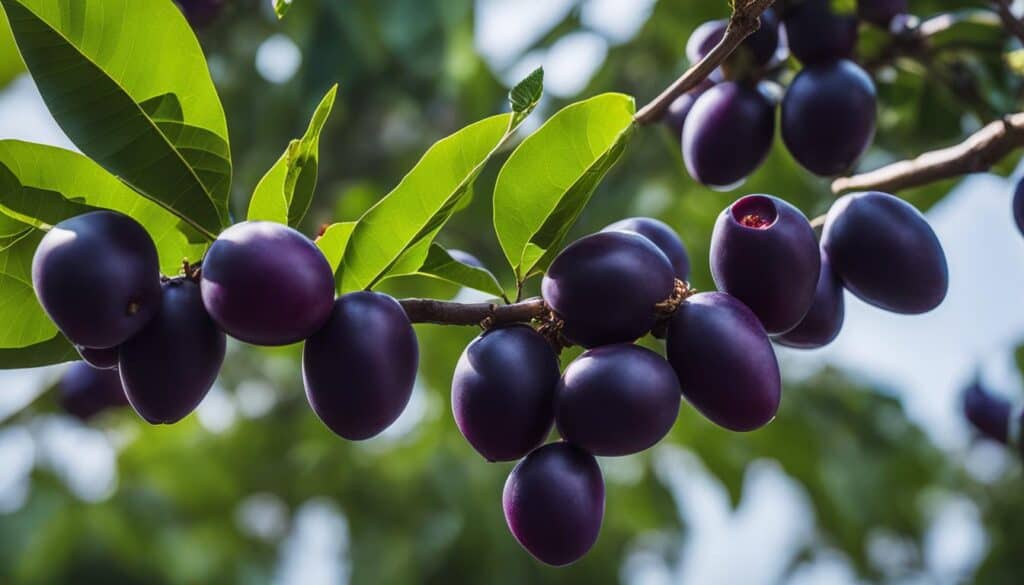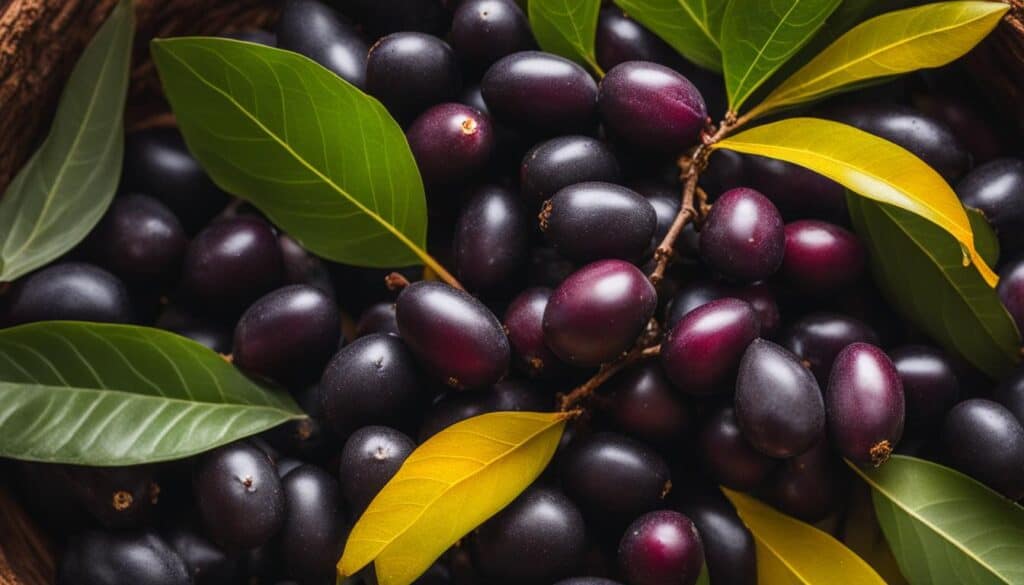The jamun tree, also known as the Indian blackberry tree or Syzygium cumini, is a tropical evergreen plant that offers numerous benefits. It produces the delicious jamun fruit and can be cultivated in gardens. The tree has been used in traditional medicine for its medicinal properties and is known for its various health benefits. Let’s explore the incredible advantages that the jamun tree has to offer.
Key Takeaways:
- The jamun tree, also known as the Indian blackberry tree, is a tropical evergreen plant.
- It produces the delicious jamun fruit and can be cultivated in gardens.
- The jamun tree has been used in traditional medicine for its medicinal properties.
- It offers various health benefits, including improving overall health and well-being.
- The jamun tree is a valuable asset for those interested in gardening or natural remedies.
The Nutritional Value of Jamun
The jamun fruit, also known as the Indian blackberry, is not only delicious but also packed with nutrients that offer numerous health benefits. Let’s take a closer look at the nutritional value of jamun and how it can contribute to a healthy diet.
Antioxidants: Jamun is rich in antioxidants, such as anthocyanins and ellagic acid, which help protect the body against free radicals and oxidative stress.
Vitamins and Minerals: Jamun is a good source of vitamin C, which is essential for boosting the immune system and promoting collagen production. It also contains minerals like iron, magnesium, and potassium, which play important roles in various bodily functions.
| Nutrient | Amount per 100g |
|---|---|
| Calories | 62 |
| Carbohydrates | 14g |
| Protein | 0.7g |
| Fiber | 0.6g |
| Vitamin C | 18mg |
| Iron | 0.19mg |
| Magnesium | 15mg |
| Potassium | 79mg |
With its low calorie content and high fiber content, jamun can also aid in weight management and improve digestion. Including jamun in your diet can be a delicious way to boost your overall health and well-being.
The Versatility of Jamun
Not only is jamun packed with nutrition, but it is also versatile in its culinary applications. You can enjoy it in various forms, such as raw, blended into juices or smoothies, added to salads, or even used to make jams and jellies. The unique flavors of jamun add a delightful twist to any dish, making it a popular choice for those looking to explore different flavors and reap the health benefits at the same time.
Health Benefits of Jamun
Due to its rich nutritional profile, jamun offers a range of health benefits:
- Boosts immune system
- Improves digestion
- Supports heart health
- Regulates blood sugar levels
- Helps with weight management
These benefits make jamun a valuable addition to a balanced diet and a natural way to support overall health and well-being.
Jamun Tree in Ayurveda and Traditional Medicine
The jamun tree plays a significant role in Ayurveda and traditional medicine, where it has been used for centuries due to its wide range of medicinal properties and health benefits. Ayurvedic practitioners have incorporated jamun into various remedies and treatments for conditions such as diabetes, heart problems, digestive issues, skin ailments, and hair health.
In Ayurveda, jamun is considered a valuable herb with many therapeutic uses. It is believed to have a cooling effect and helps balance the body’s doshas, particularly Pitta and Kapha. The different parts of the jamun tree, including the fruit, seeds, bark, leaves, and even the juice, are used in Ayurvedic preparations to address specific health concerns.
One of the most well-known medicinal uses of the jamun tree is its effectiveness in managing diabetes. The fruit and seeds of jamun are known to have hypoglycemic properties that help regulate blood sugar levels. Jamun helps stimulate insulin production and enhances insulin sensitivity, making it a natural aid for diabetic individuals. Regular consumption of jamun or its derivatives can help manage blood sugar levels and prevent diabetic complications.
The jamun tree is also known to be beneficial for heart health. It possesses antioxidant properties that help reduce oxidative stress and prevent the formation of plaque in the arteries. Additionally, jamun is rich in potassium, which helps regulate blood pressure and promotes cardiovascular health. Including jamun in your diet or consuming its extracts can help maintain a healthy heart.
“Jamun is a powerful fruit that has been used in Ayurveda for its various health benefits. It is particularly effective in managing diabetes, as it helps regulate blood sugar levels. Additionally, jamun promotes heart health and has been used to treat digestive issues, skin ailments, and hair problems. Its versatility and effectiveness have made it a staple in traditional medicine.”
Jamun in Ayurveda: Summary
- Used in Ayurvedic remedies and treatments
- Helps manage diabetes by regulating blood sugar levels
- Beneficial for heart health and cardiovascular function
- Addresses digestive issues, skin ailments, and hair problems
- Believed to balance Pitta and Kapha doshas in Ayurveda
Jamun Tree Cultivation and Care
If you’re interested in cultivating a jamun tree in your garden, it’s important to know the proper techniques for successful growth. Here are some essential tips for cultivating and caring for a jamun tree:
1. Choosing the Right Location
The jamun tree thrives in a tropical climate, so it’s important to ensure that your garden provides the necessary conditions. Select a location with full sunlight and well-drained soil to promote healthy growth.
2. Propagation Methods
The jamun tree can be propagated from seeds or cuttings. If you choose to grow from seeds, plant them directly in the soil at a depth of 1-2 inches. For cuttings, select a healthy branch and trim it to about 10-12 inches in length. Remove any leaves from the lower portion of the cutting and plant it in a pot filled with well-drained soil.
3. Pruning and Maintenance
Regular pruning is essential for maintaining the shape and health of the jamun tree. Prune away any dead or diseased branches and trim back excessive growth to promote proper airflow and sunlight penetration. It’s also important to regularly water and fertilize the tree to ensure its overall health and growth.
4. Disease Prevention
Like any other plant, the jamun tree is susceptible to certain diseases and pests. To prevent common issues such as fungal infections or insect infestations, ensure that the tree is properly cared for and monitored regularly. If you notice any signs of disease or pests, take immediate action to address the issue.
| Cultivation Tips | Care Tips |
|---|---|
| Choose a location with full sunlight and well-drained soil | Regularly prune the tree to maintain its shape and health |
| Propagate from seeds or cuttings | Monitor for disease and pest infestations |
| Water and fertilize the tree regularly |
By following these cultivation and care tips, you can enjoy the beauty and benefits of a thriving jamun tree in your garden. Remember to provide the tree with the necessary sunlight, water, and pruning to ensure its long-term health and vitality.
Continue reading to discover the potential metabolic health benefits of the jamun tree in the next section.
Jamun Tree for Metabolic Health

The jamun tree has gained attention for its potential benefits in improving metabolic health. Research suggests that this tropical tree, also known as Syzygium cumini or Indian blackberry tree, may have a positive impact on diabetes management, obesity control, hypertension, and hyperlipidemia.
Studies have shown that consuming jamun, either as fresh fruit or in supplement form, can help regulate blood sugar levels in individuals with diabetes. The fruit’s natural compounds, such as jamboline and ellagic acid, contribute to its antidiabetic properties. By enhancing insulin sensitivity and reducing blood glucose levels, jamun can support diabetes management.
Besides its effects on blood sugar control, the jamun tree also shows promise in combating obesity. It has been found to aid in weight loss by reducing fat accumulation and improving metabolic functions. The high fiber content of jamun contributes to increased satiety, promoting a feeling of fullness and reducing overeating.
| Condition | Potential Benefits |
|---|---|
| Diabetes | Regulates blood sugar levels |
| Obesity | Aids in weight loss |
| Hypertension | Helps control blood pressure |
| Hyperlipidemia | Improves lipid profile |
Additionally, the jamun tree has been found to have a positive impact on hypertension and hyperlipidemia. Its antioxidants and bioactive compounds help reduce oxidative stress, inflammation, and lipid peroxidation, which are underlying factors in these conditions. Regular consumption of jamun may contribute to better heart health and improved lipid profiles.
While the jamun tree shows promise in improving metabolic health, it is essential to consult with a healthcare professional before incorporating jamun into your diet or treatment plan. They can provide personalized guidance based on your health condition and any medication you may be taking. Remember, natural remedies should complement conventional medical approaches rather than replace them.
The Culinary Delights of Jamun: Recipes and Uses
When it comes to culinary adventures, the versatile jamun fruit offers a plethora of options. From refreshing drinks to delectable jams, there are numerous ways to incorporate this flavorful fruit into your recipes. Let’s explore some mouthwatering jamun fruit recipes and discover the delightful culinary uses of this extraordinary fruit.
1. Jamun Juice: Start your day with a burst of flavor and nutrition by whipping up a refreshing glass of jamun juice. Simply blend ripe jamun fruits with water, strain the mixture, and add a dash of lemon juice and honey for a tangy twist. This vibrant purple beverage is not only visually appealing but also packed with antioxidants and vitamins.
2. Jamun Smoothies: For a creamy and indulgent treat, try making a jamun smoothie. Blend jamun fruits with yogurt, banana, and a drizzle of honey for a luscious and nutritious drink. You can also experiment with adding other fruits like mango or pineapple to create unique flavor combinations.
3. Jamun Salad: Add a burst of color and tanginess to your salads by incorporating sliced jamun fruits. Their vibrant hue and slightly tart taste make them the perfect addition to mixed greens, cucumber, and feta cheese. Drizzle with a light vinaigrette and enjoy a refreshing and nutritious salad.
4. Jamun Jam: Turn your bounty of fresh jamun fruits into a delicious and sweet jam. Simmer ripe jamun fruits with sugar, lemon juice, and a pinch of cinnamon until it thickens to a spreadable consistency. Spread this delightful jam on toast or use it as a topping for desserts to savor the unique flavor of jamun.

In Ayurveda, the jamun tree is highly regarded for its ability to balance the doshas and promote overall well-being. It is considered to have a cooling effect on the body and is used to pacify excess heat or pitta. The bark and leaves of the jamun tree are often used to make herbal preparations that help in managing diabetes. The fruits are believed to have astringent and digestive properties, making them beneficial for gastrointestinal issues.
Traditional remedies with jamun are passed down through generations and continue to be used for various ailments. The juice of jamun leaves is used to treat diarrhea and dysentery. The powdered seeds of the fruit are known for their anti-diabetic properties and are used in managing blood sugar levels. The leaves, bark, and seeds of the jamun tree are also used as a natural remedy for skin conditions like acne and eczema.
The jamun tree’s role in Ayurveda and traditional medicine showcases its versatility and effectiveness as a natural healing agent. With its wide array of uses and reported benefits, it is no wonder that the jamun tree holds a revered position in ancient healing practices.
Growing a Jamun Tree in Your Garden
Are you interested in adding a touch of natural beauty to your garden? Consider growing a jamun tree! The jamun tree, with its vibrant foliage and delicious fruit, can be a stunning addition to any outdoor space. But how do you successfully cultivate and care for a jamun tree in your garden? Let’s explore some tips and tricks to help you get started.
Planting a Jamun Tree
The first step in growing a jamun tree is selecting a suitable location in your garden. Jamun trees thrive in tropical climates and require plenty of sunlight for optimal growth. Choose a spot that receives at least 6 hours of direct sunlight each day. The soil should be well-drained, with a pH level between 6.5 and 7.5. Avoid planting the tree in areas prone to waterlogging, as excess moisture can cause root rot.
When planting a jamun tree, dig a hole twice the size of the root ball and place the tree in the center. Backfill the hole with soil, ensuring that the tree is planted at the same depth it was in the nursery container. Gently tamp down the soil around the base of the tree to secure it in place. Water the tree thoroughly after planting to help it establish roots.
Caring for Your Jamun Tree
Proper care is essential for the health and growth of your jamun tree. Regular watering is crucial, especially during the dry months. Water the tree deeply, ensuring that the soil is moist but not waterlogged. Applying a layer of organic mulch around the base of the tree can help retain moisture and suppress weed growth.
Additionally, pruning is necessary to maintain the shape and promote healthy growth of your jamun tree. Prune away any dead or diseased branches, as well as any branches that are crossing or rubbing against each other. Pruning should be done during the dormant season, typically in late winter or early spring.
Pest and Disease Control
Keeping pests and diseases at bay is essential for the overall well-being of your jamun tree. Regularly inspect the tree for signs of infestation or disease, such as distorted leaves, discoloration, or wilting. If you notice any issues, promptly treat them with appropriate organic or chemical solutions. Additionally, practicing good sanitation by removing fallen leaves and fruit can help prevent the spread of diseases.
With proper planting, care, and pest control, your jamun tree can thrive in your garden and provide you with beautiful foliage and delicious fruit for years to come.
| Planting Tips | Care Tips | Pest and Disease Control |
|---|---|---|
|
|
|
Conclusion
The jamun tree is a true marvel, offering a multitude of benefits that make it an invaluable asset. Whether you are seeking improved health, a thriving garden, or delightful culinary creations, the jamun tree has something to offer to everyone.
With its nutritious fruit, packed with antioxidants, vitamins, and minerals, the jamun tree can significantly boost your overall well-being. From boosting your immune system to aiding in digestion, this fruit provides a wide range of health benefits.
Furthermore, the jamun tree has a long-standing history in Ayurveda and traditional medicine. Its medicinal properties have been utilized for centuries to address conditions such as diabetes, heart problems, digestive issues, and skin ailments. This rich heritage only serves to highlight the true value of the jamun tree.
By understanding how to cultivate and care for a jamun tree, you can fully appreciate its many uses and benefits. From planting a young tree in your garden to providing the necessary care and maintenance, you can create an environment where the jamun tree thrives and flourishes.
So why wait? Dive into the incredible world of the jamun tree and reap the rewards it has to offer. Enhance your health, beautify your garden, and indulge in delicious culinary creations – all thanks to the amazing jamun tree.
FAQ
What are the health benefits of jamun?
Jamun is highly nutritious and rich in antioxidants, vitamins, and minerals. It can boost the immune system, improve digestion, and provide various health benefits.
What are the medicinal uses of the jamun tree?
The jamun tree has been traditionally used in Ayurvedic medicine for diabetes management, heart health, weight loss, skin health, and hair health.
How can I cultivate a jamun tree in my garden?
The jamun tree requires a tropical climate and well-drained soil. It can be propagated from seeds or cuttings and requires proper pruning and care for healthy growth.
Can the jamun tree improve metabolic health?
Yes, research suggests that jamun can help regulate blood sugar levels, aid in weight loss, and have a positive impact on conditions like hypertension and hyperlipidemia.
What are some culinary applications of jamun?
Jamun can be enjoyed raw, added to juices, smoothies, salads, or used to make jams and jellies. There are various recipes that incorporate jamun for unique flavors and health benefits.
What is the significance of the jamun tree in traditional medicine?
The jamun tree has been used for centuries in Ayurveda and traditional medicine for conditions such as diabetes, heart problems, digestive issues, and skin ailments.
How do I grow and care for a jamun tree in my garden?
Plant a young jamun tree in proper sunlight, provide adequate watering and fertilizing, and ensure regular care and maintenance through pruning and disease prevention.
What are the benefits of the jamun tree?
The jamun tree offers a multitude of benefits, from its nutritious fruit to its medicinal properties, making it a valuable asset for health improvement, gardening, and culinary creations.






Leave a Reply